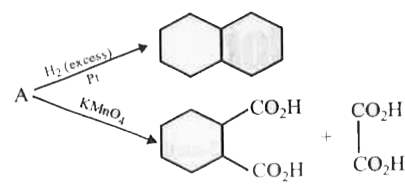
Compound (A) will be :
A
Ph−C≡C−C≡C−CHO
B
Ph−C≡C−CH=CH−CHO
C
Ph−CH=CH−C≡C−CHO
D
Ph−CH=CH−C=CH−CO2H
Video Solution
Text Solution
The correct Answer is:C
(c) 
|
Topper's Solved these Questions
- ALDEHYDES AND KETONES BOOK - MS CHOUHANCHAPTER - ALDEHYDES AND KETONES EXERCISE - Level 1 (Q.121 To Q.150)
1 Videos
- ALDEHYDES AND KETONES BOOK - MS CHOUHANCHAPTER - ALDEHYDES AND KETONES EXERCISE - Level 2
7 Videos
- ALCOHOLS FROM CARBONYL COMPOUNDSBOOK - MS CHOUHANCHAPTER - ALCOHOLS FROM CARBONYL COMPOUNDSEXERCISE - Additional Objective Questions (Multiple Correct Choice Type )
1 Videos
- ALDEHYDES AND KETONES I. NUCLEOPHILIC ADDITION TO THE CARBONYL GROUPBOOK - MS CHOUHANCHAPTER - ALDEHYDES AND KETONES I. NUCLEOPHILIC ADDITION TO THE CARBONYL GROUPEXERCISE - ADDITIONAL OBJECTIVE QUESTIONS (SINGLE CORRECT CHOICE TYPE)
17 Videos
Similar Questions
Knowledge Check

Compound (A) is ,A B
B C
C D
D
 . Compounds is : C. Compound ( C) is : A
. Compounds is : C. Compound ( C) is : A B
B C
C D
D
Compound (A) is heated with KCN produces butyronitrile. The compound (A) is
An-propyl alcoholBn-butyl chlorideCn-propyl chlorideDn-propyl amine
An organic compound A C4H8on treatment with KMnO4/H+ Yields compound 'B'C3H5O
Compound 'A' also yields compound 'B' an ozonolysis. Compound 'A' is :
View SolutionAddition Compound And Complex Compound
View SolutionCyclohexane is an..........compound while benzene is an...........compound.
View SolutionAn aqueous solution of compound A gives ethane or electrolysis. The compound A is :
View SolutionThe solution of one of the following compounds will not conduct electricity. This compound is :
View Solution
